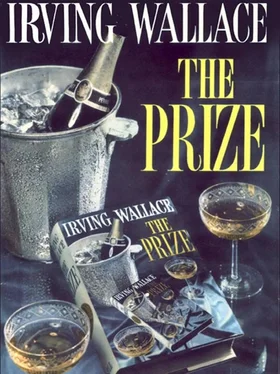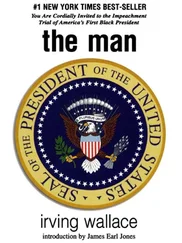‘Frans Eemil Sillanpää-’ he began.
‘Frans Eemil who? ’
‘Sillanpää,’ he repeated weakly, ‘the Finnish author. When he learned that he had won the Nobel Prize for literature in 1939, he immediately proposed marriage to his secretary and then went off on a fourteen-day drunk.’
Sue Wiley scowled. ‘Is that all?’
Momentarily, Daranyi lost his composure. ‘I-I think it is amusing.’
‘If that had happened to Red Lewis or Pearl Buck, sure. But who in the hell gives a hoot about Frans Eemil Whatever-his-name-is?’
Grieved, Daranyi tried to save Sillanpää. ‘There is more to it, Miss Wiley. The Swedish Academy was prejudiced for Sillanpää, because he had tried to make Swedish the official language of Finland. Also, when the voting started in 1939, Russia was invading Finland, and by honouring a Finn, the judges were making a gesture against Communism.’
Sue Wiley gave Daranyi no encouragement.
With quiet desperation, he slogged on. ‘Also-also-Sillanpää was a friend of Sibelius-no, I suppose that is not important. At any rate, he was poor and a widower with seven children, and when he heard that he had won the prize, he sent his seven children running through Helsinki shouting, “Father’s rich!” ’
‘Strike one,’ said Sue Wiley grimly.
‘I do not understand?’
‘It means you have one strike on you, and you’d better start swinging. Mr. Daranyi, I’ve got news for you-nobody, but nobody, in Kansas City or Denver or Seattle gives a damn what happened to Sillanpää. You’ll have to do better than that. What else have you got in the hopper?’
‘Sir Venkata Raman won the physics award in 1930-’
‘Never heard of him.’
‘The Raman ray, Miss Wiley. He discovered it. He came from the University of Calcutta, wearing a turban, and he created the most embarrassing moment in the history of the Nobel Prize. When he made his speech, after the Ceremony, he accepted a toast to his award by glaring at the British Minister and saying, “I accept not on my own behalf, but on behalf of my country and on behalf of those of my great colleagues who are now in jail.” ’
Sue Wiley looked off with irritation. ‘Where are those meatballs? Are they growing them?’
‘This Raman-’ said Daranyi.
‘You can keep him. That’s two strikes. One more to go.’
Daranyi, in disorderly retreat, scrambled through his memory, brushing past the great names he had waiting in line, until he found one and brought him forward. Andrew Craig. Andrew Craig and Lilly Hedqvist. He, alone, by lucky chance, knew of their love affair. What if he revealed it now? Ah, how Miss Wiley’s mouth would water for every detail. This would win the day. But then, he saw, this act of revelation would make him as detestable as was Miss Wiley in his eyes. It would also make him a traitor to friendship, his only fatherland on earth. He had liked Craig enormously, and he regarded Lilly protectively, as a child of his own. Not Wiley, not Krantz, were worth losing her. Ashamed for having even considered the betrayal, aware of his guest’s impatience, he hastily located another author of the same nationality and led him to the assassin. It was all or nothing now. ‘Americans-’ he said, and hesitated.
Sue Wiley was attentive. ‘Americans? What about them?’
‘They were not always favoured in the Swedish Academy. There was strong resistance to Sinclair Lewis, the first American author to-’
‘I already heard that from Gunnar Gottling.’
‘Did you hear that Sinclair Lewis’s publisher in New York, Alfred Harcourt, had been secretly promoting Lewis for a long time to win the prize?’
‘You mean Harcourt was lobbying for him? In what way?’
‘I do not know. It is only something I heard. I cannot prove it.’
‘Doesn’t matter,’ said Sue Wiley. ‘That’s good, that’s more like it.’
In that instant, Daranyi realized what she wanted of him, not bold human-interest sidelights but stupid slivers of modern gossip. Immediately, he consolidated his short gain. ‘There is the other one with a similar name-yes, Upton Sinclair. He was nominated for the Nobel Prize in 1932 by seven hundred and seventy famous people.’
‘I didn’t know that.’
‘Oh yes, Albert Einstein, Bertrand Russell, Harold Laski, they all nominated him, but he was defeated by John Galsworthy. And W. Somerset Maugham, he was once nominated for the Nobel Prize, but he lost because a majority of the judges said that he was too popular.’
Sue Wiley clapped her hands. ‘Wonderful. Home run, Mr. Daranyi. And you’ve got more where that came from?’
Daranyi felt the tension go out of his shoulders. ‘Much, much more, Miss Wiley.’
‘Good. We’re in business.’
His confidence came hobbling back. ‘Not quite, Miss Wiley. This is a two-way proposition. I have not yet heard what you have to offer.’
His sudden lack of timidity surprised not only himself but Sue Wiley as well. ‘You don’t have to worry about my end of it,’ she said. ‘I’m loaded. When we get back to the hotel-’
‘I must know now,’ he said, more than ever pleased with himself. ‘I must have what you call the preview sample.’
‘All right,’ she said generously, ‘fair’s fair. Let me see-’
He recalled the names on which Krantz had placed emphasis. ‘Dr. John Garrett?’ he suggested.
‘Garrett?’ Sue Wiley nodded. ‘Sitting duck. He and Dr. Carlo Farelli hate each other.’
‘I know all about that, Miss Wiley.’
‘You do?’ Her eyebrows had shot up, and now she was suddenly respectful.
‘Indeed I do. They had an altercation at the Royal Banquet. And on another public occasion.’ He was pleased to retaliate in this way, and silently he thanked Hammarlund’s secretary.
‘Well, do you know that Garrett is in psychoanalysis in Los Angeles?’
‘No, that I did not know. Most interesting. I would be pleased to hear more.’
Sue Wiley glanced about her. ‘Not here. But soon enough. Are you satisfied?’
‘What about Professor Max Stratman?’
‘There’s not too much new on him. You know about his background during the war?’
‘I do.’
‘Mmm. But in Stockholm?’
‘I know nothing.’
‘Well, then,’ said Sue Wiley, ‘for one thing, he’s apparently got a heart condition, been seeing a heart specialist at the Southern Hospital. Also, he had lunch at Riche the other day with some big-shot German Commie-I don’t know who yet, somebody who just checked in from East Berlin.’
Daranyi’s veins swelled in his temples. This was good, too good. He tried to think: was this armament for Krantz or against Krantz? He wondered. Then he remembered that he had his role. ‘Yes-yes-interesting, Miss Wiley. Of course, not exactly material of enduring quality for a staid historian-yet, one never knows. I think you will be a useful contributor. Indeed, I shall acknowledge your help in my book.’
‘Just leave me out of your book,’ said Sue Wiley. She observed the waitress coming with their tray, and beyond the waitress, just being seated, the famous actress, Märta Norberg, and a rather severe woman who resembled a governess and whom she suddenly identified as the writer Craig’s sister-in-law. ‘Here’s lunch,’ she said to the Hungarian. ‘About time. The place is getting too crowded. Let’s make it fast and get back to the hotel. Our afternoon’s work is cut out for us.’
Emily Stratman hummed softly as she rode the elevator to the third floor of the Grand Hotel. Although she had long ago banished all that was German from her life, the tune that she now hummed, a stray wisp of recall from childhood, was Du , du , liegst mir im Herzen , Du du liegst mir im Sinn .
Читать дальше












